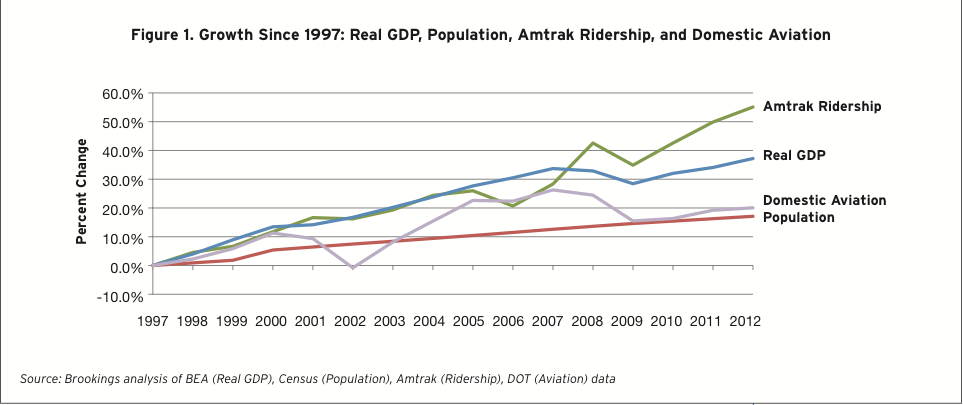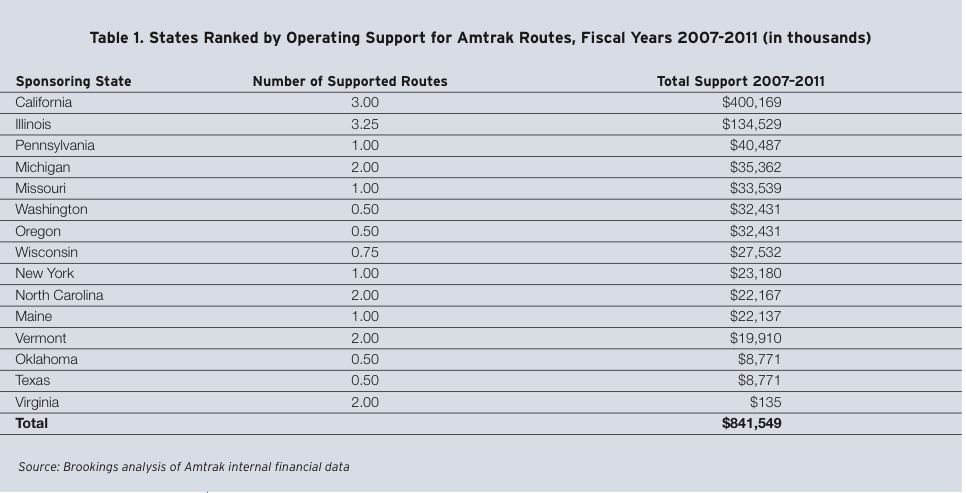BROOKINGS INSTITUTION
American passenger rail is in the midst of a renaissance. Ridership on Amtrak—the primary U.S. carrier—is now at record levels and growing fast. This research shows that the country’s 100 largest metropolitan areas are primarily behind this trend, especially ten major metros responsible for nearly two-thirds of total ridership. Driving the connection between these metropolitan areas are short-distance corridors, or routes traveling less than 400 miles, that carry 83 percent of all Amtrak passengers. States now have formalized relationships with Amtrak to upgrade tracks, operate routes, and redevelop stations. The result is a new federalist partnership where Amtrak, the federal government, and states share responsibility for the network’s successes and failures. To continue the reinvention, this report recommends that Amtrak, the federal government, and states should:
- Broker a new agreement between Amtrak and the states to share operating costs and other responsibilities for corridors longer than 750 miles;
-
Refine existing programs to promote intermodalism, empower broader funding flexibility towards rail activities, and create a dedicated funding source for future rail investments;
-
Complete a national rail plan, do more to promote multistate rail compacts, and foster a stronger relationship between public agencies and private capital and management firms
Introduction
Across the nation, there are ongoing deliberations as to which transportation and infrastructure assets will support the next American economy. The freight railroads tout their energy efficiency and role in exporting goods. Aviation is a key industry when it comes to fostering the global intermetropolitan connections critical for future economic growth. Car manufacturers are recasting themselves as consumer electronics manufacturers, expanding notions of mobility into connectivity. And many mass transit agencies are experiencing something of a renaissance as they contribute to building communities instead of just moving people from point A to point B.
What about passenger rail and its notoriously beleaguered provider, Amtrak? Considered by some to be a big, bloated bureaucracy incapable of change and dependent on federal subsidies, it may seem more representative of a bygone era and no longer relevant in the globally-oriented and technologically-enabled metropolitan economies of today.
But look again. Although faced with an uncertain future ever since its creation in 1971, Amtrak is reinventing itself.
A new partnership between states and the federal government focused on improving operations and financial sustainability is taking hold. As a result, it has opened up a valuable and important debate about the very future of American passenger rail.
This report is intended to inform that conversation by examining key trends of passenger rail in America today. First, we assess national rail travel trends over time, looking at passenger data since 1997. We then disaggregate those national passenger statistics to uncover the specific metropolitan areas generating the majority of travel. The next section analyzes routes based on their length, examining both ridership and financial performance. Finally, we synthesize these findings into a series of federal implications and implementable recommendations for policymakers.
In the end we find that because of this new policy alignment, passenger rail in the United States is on the track to success. But given Amtrak’s complex and unique nature as a quasi-public national corporation, several key reforms are needed to enhance the new model for federalism and support dynamic metropolitan growth.
Read full report (PDF) here: A New Alignment
About Brookings Institution
www.brookings.edu
“The Brookings Institution is a nonprofit public policy organization based in Washington, DC. Our mission is to conduct high-quality, independent research and, based on that research, to provide innovative, practical recommendations that advance three broad goals:
* Strengthen American democracy;
* Foster the economic and social welfare, security and opportunity of all Americans and
* Secure a more open, safe, prosperous and cooperative international system.
Brookings is proud to be consistently ranked as the most influential, most quoted and most trusted think tank.”
Tags: Amtrak, Brookings Institution








 RSS Feed
RSS Feed